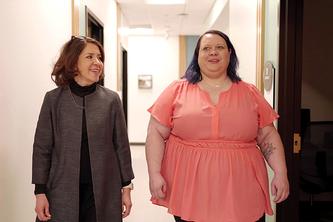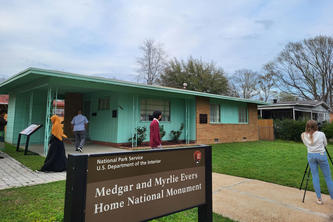
According to the Centers for Disease Control and Prevention, in 2020, only 46.9% of U.S. adults aged 18 and over met the physical activity guidelines for aerobic physical activity, and just 24.2% percent met the physical activity guidelines for both aerobic and muscle-strengthening activity.
As we approach National Physical Fitness Month in May, College of Education and Human Development Professor Beth Lewis speaks to the importance of physical fitness at every age.
Beth Lewis, Ph.D.
“Physical activity is important for preventing chronic health conditions, improving mental health and overall quality of life. Consequently, the U.S. Department of Health & Human Services recommends that all healthy adults, regardless of age, participate in at least 150 minutes of moderate-intensity physical activity or 75 minutes of vigorous-intensity physical activity per week. It is also recommended that healthy adults engage in at least two days per week of strength training. Unfortunately, few adults meet the cardiovascular recommendations, and even fewer meet the strength training guidelines.
“Strength training is important for building muscle mass, which helps prevent bone loss, improves balance and reduces the risk of falling. Therefore, strength training is particularly important for older adults. Muscle mass and strength increase from birth to around 30-35 years of age before muscle power and performance slowly decline. This rate of decline significantly increases after age 65 for women and 70 for men. There is an old idea that older adults should be careful with their bodies to avoid injury. However, if older adults are cleared medically, strength training is the best thing older adults can do to preserve their body. It is about changing the mindset from, “I should not lift weights because of my age,” to “I need to lift weights because of my age.”
Beth Lewis is a professor in the College of Education and Human Development and the director of the School of Kinesiology. Her research focuses on physical activity promotion, behavioral interventions for physical activity, exercise and mental health. Her most recent studies have been randomized trials examining the effect of exercise on mental health (e.g., depression during pregnancy and postpartum). Other ongoing research has included examining the efficacy of home-based high-intensity interval training (HIIT) and strength training for improving physical activity adherence.
About the College of Education and Human Development
The University of Minnesota College of Education and Human Development (CEHD) strives to teach, advance research and engage with the community to increase opportunities for all individuals. As the third largest college on the Twin Cities campus, CEHD research and specialties focus on a range of challenges, including educational equity, teaching and learning innovations, children’s mental health and development, family resilience and healthy aging. Learn more at cehd.umn.edu.
- Categories:
- Health
- Sports and Recreation
- Health conditions




